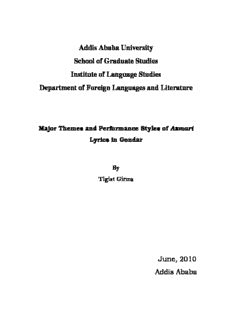
Major Themes and Performance Styles of Azmari Lyrics in Gondar PDF
Preview Major Themes and Performance Styles of Azmari Lyrics in Gondar
ADDIS ABABA UNIVERSITY SCHOOL OF GRADUATE STUDIES SCHOOL OF INFORMATION SCIENCE AND SCHOOL OF PUBLIC HEALTH A CONTEXTUAL FRAMEWORK FOR IMPROVING KNOWLEDGE SHARING AMONG HEALTHCARE PROFESSIONALS AT ST. PETER’S HOSPITAL BY: SHEHIRA FARUK A Project Submitted to the School of Graduate Studies of Addis Ababa University in the Partial Fulfillment of the Requirement for the Degree of Master of Science in Health Informatics June, 2015 Addis Ababa, Ethiopia ADDIS ABABA UNIVERSITY SCHOOL OF INFORMATION SCIENCE AND SCHOOL OF PUBLIC HEALTH M.SC IN HEALTH INFORMATICS PROGRAM A CONTEXTUAL FRAMEWORK FOR IMPROVING KNOWLEDGE SHARING AMONG HEALTHCARE PROFESSIONALS AT ST. PETER’S HOSPITAL A Project Submitted to the School of Graduate Studies of Addis Ababa University in the Partial Fulfillment of the Requirement for the Degree of Master of Science in Health Informatics BY: SHEHIRA FARUK June, 2015 Addis Ababa, Ethiopia ADDIS ABABA UNIVERSITY SCHOOL OF INFORMATION SCIENCE AND SCHOOL OF PUBLIC HEALTH A CONTEXTUAL FRAMEWORK FOR IMPROVING KNOWLEDGE SHARING AMONG HEALTHCARE PROFESSIONALS AT ST. PETER’S HOSPITAL BY: SHEHIRA FARUK Name and Signature of Members of the Examining Board __________________________________________________________ Examiner Signature Date Examiner Signature Date Advisor Signature Date Advisor Signature Date Acknowledgment Above all I am thankful for Allah who gave me the strength in completing this project. My next deepest gratitude goes to my advisers Dr. Eshetu Girma and Dr. Million Meshesha for their encouragement and constructive comments through out my project work. Last but not list I would like to thank parents and friends (Umer Mudde and Mazashwork Asefa) for each and every support they enriched me with. i TABLE OF CONTENT Page Acknowledgment ...................................................................................................................i List of Tables ..................................................................................................................... vi Table of Figures ................................................................................................................ vii Acronyms ......................................................................................................................... viii Abstract ............................................................................................................................. vii CHAPTER ONE ................................................................................................................. 1 INTRODUCTION .............................................................................................................. 1 1.1 Background ....................................................................................................................... 1 1.1.2. Overview of St. Peter’s Hospital ....................................................................... 2 1.2 Statement of the Problem ................................................................................................... 3 1.3. Objective of the Project .................................................................................................... 5 1.3.1 General Objective ............................................................................................... 5 1.3.2 Specific Objectives ............................................................................................. 5 1.4 Significance of the Project ................................................................................................. 5 1.5 Scope and Limitation of the Project ................................................................................. 6 1.6 Organization of the Study .................................................................................................. 6 CHPATER TWO .............................................................................................................. 7 LITERATURE REVIEW ................................................................................................... 7 2.1 Knowledge and its Type .................................................................................................... 7 2.2 Knowledge Management ................................................................................................... 8 2.3. Knowledge Management in Healthcare .......................................................................... 9 2.4 Knowledge Management Life Cycle.............................................................................. 10 2.5.1 The Knowledge Creation Process ..................................................................... 11 2.5.2 The Knowledge Structuring Process ................................................................ 11 2.5.3 The Knowledge Dissemination Process ........................................................... 11 ii 2.5.4 The knowledge Application Process ................................................................ 11 2.5 Knowledge Sharing (KS) Model .................................................................................... 12 2.5.1 Knowledge Transfer Model .............................................................................. 12 2.6 Knowledge Sharing in an Organization ......................................................................... 14 2.7 Factor Affecting Knowledge Sharing ............................................................................ 15 2.7.1 Individual/ Human Factors ............................................................................... 16 2.7.1.1 Willingness ............................................................................................... 16 2.7.1.2 Trust .......................................................................................................... 16 2.7.1.3 Awareness ................................................................................................. 16 2.7.1.4 Reciprocity ................................................................................................ 16 2.8.1.5 Intrinsic Benefit ........................................................................................ 17 2.7.1.6 Personality ................................................................................................. 17 2.7.2 Organizational Factors ...................................................................................... 17 2.7.2.1 Openness ................................................................................................... 18 2.7.2.2 Group Interaction ...................................................................................... 18 2.7.2.3 Supportive Leadership .............................................................................. 18 2.7.2.4 Extrinsic Benefit ....................................................................................... 18 2.7.2.5 Organizational Office Layout ................................................................... 18 2.7.2.6 Work Process ............................................................................................ 19 2.7.3 Technological Factor ........................................................................................ 19 2.9 Related Works ................................................................................................................... 19 CHAPTER THREE .......................................................................................................... 24 METHODOLOGY ........................................................................................................... 24 3.1 Study Area ......................................................................................................................... 24 3.2 Study Design ..................................................................................................................... 24 3.3 Source Population ............................................................................................................. 24 3.4 Study Population ............................................................................................................... 25 iii 3.5 Sample Size ....................................................................................................................... 25 3.6 Sampling Procedure ......................................................................................................... 25 3.7 Data Collection ................................................................................................................. 25 3.8 Data Processing and Analysis ......................................................................................... 26 3.9 Data Quality Management ............................................................................................... 26 3.10 Conceptual Framework .................................................................................................. 27 3.11 Operational Definition ................................................................................................... 28 3.12 Study Variables ............................................................................................................... 29 3.13 Measurements ................................................................................................................. 29 3.14 Ethical Clearance ............................................................................................................ 31 CHAPTER FOUR ............................................................................................................. 32 DISCUSSION OF STUDY RESULTS ............................................................................ 32 4.1 Result of Quantitative ...................................................................................................... 32 4.1.1 Socio-demographic Characteristics of the Respondents .......................................... 32 4.1.2 Knowledge Sharing Practice of Study Participants .......................................... 33 4.1.3 Knowledge Sharing Mechanisms within St. Peter’s Hospital .......................... 33 4.1.4 Documentation.................................................................................................. 34 4.1.5 Motivation ........................................................................................................ 34 4.1.6 Factors Affecting Knowledge Sharing ............................................................. 35 4.1.6.1 Individual Factor ....................................................................................... 35 4.1.6.1.1 Willingness to Share Knowledge ........................................................ 35 4.1.6.1.2 Awareness ........................................................................................... 35 4.1.6.1.3 Personality........................................................................................... 35 4.1.6.1.4 Trust .................................................................................................... 35 4.1.6.1.5 Intrinsic Benefit .................................................................................. 35 4.1.6.1.6 Perceived Loss of Knowledge Power ................................................. 35 4.1.6.1.7 Job Satisfaction ................................................................................... 35 iv 4.1.6.2. Organizational Factor ............................................................................... 36 4.1.6.2.1 Organizational Culture ........................................................................ 36 4.1.6.2.1.1 Knowledge Sharing Opportunity .................................................. 36 4.1.6.2.1.2 Openness ....................................................................................... 36 4.1.6.2.1.3 Supportive Leadership .................................................................. 36 4.1.6.2.2 Organizational Structure ..................................................................... 36 4.1.6.2.2.1 Extrinsic Benefit ........................................................................... 36 4.1.6.2.2.2 Organizational Arrangement ......................................................... 36 4.1.6.3 Technological Factors ............................................................................... 37 4.1.7 Bivariate and Multivariate Analysis ................................................................. 37 4.2 Result of Qualitative Study ............................................................................................. 37 4.3 Discussion .......................................................................................................................... 39 4.4 Findings of the Study ....................................................................................................... 45 4.4.1 From Individual Factors ................................................................................... 45 4.4.2 From Organizational Factor .............................................................................. 46 4.4.2.1 Organizational Culture .............................................................................. 46 4.4.2.2 Organizational Structure ........................................................................... 47 4.4.3 Impact of ICT on Knowledge Sharing Barriers ................................................ 48 4.5 Proposed Contextual Framework ..............................................................................50 4.6 Knowledge Sharing Framework Evaluation ................................................................. 52 CHAPTER FIVE .............................................................................................................. 54 CONCLUSIONS AND RECOMMENDATIONS ........................................................... 54 5.1. Conclusions ...................................................................................................................... 54 5.2 Recommendations ............................................................................................................. 55 References Annexes v List of Tables Table4. 1 socio-demographic characteristics of respondents in St. Peter’s Hospital, 2015, Addis Ababa, Ethiopia, n=185 ........................................................................... 32 Table.4.2: presence of knowledge sharing mechanism within St. Peter’s Hospital, 2015, Addis Ababa, Ethiopia. ...................................................................................... 33 vi Table of Figures Page Figure 2.1 The knowledge management cycle [34] .......................................................... 12 Figure 2.2 Critical Factors for Knowledge Transfer based on Szulanski’s model of 1996 [35] .................................................................................................................. 13 Figure 3.1 A conceptual framework for evaluating knowledge sharing adopted from [39,16,20,15] ................................................................................................... 27 Figure 4.1 factors improving willingness of healthcare professionals in St. Peter’s hospital, 2015 .................................................................................................. 48 Figure 4.2 proposed contextual framework for enhancing knowledge sharing among healthcare professional in St. Peter’s Hospital, 2015 ..................................... 52 vii
Description: